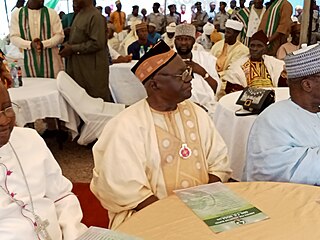Major Gideon Gwaza Orkar was a Nigerian military officer who staged a violent coup against the government of General Ibrahim Babangida on April 22, 1990. Orkar and his conspirators seized the FRCN radio station, various military posts around Lagos and the Dodan Barracks, Lagos, the military headquarters and presidential Villa. Babangida was present when the barracks were attacked but managed to escape by a back route.
Abubakar Dangiwa Umar was governor of Kaduna state in Nigeria from August 1985 to June 1988 during the military regime of General Ibrahim Babangida. After retiring from the army in 1993, he became a social critic and the founder of Movement for Unity and Progress, a political party.
Sani Bello is a Nigerian statesman and military administrator who served as Governor of Kano State from 1975 to 1978. After his retirement, he amassed an enormous fortune through investments in oil, telecommunications and electricity; going on to establish the Sani Bello Foundation.
Umaru Mohammed was appointed Governor of North-Western State in Nigeria in July 1975 at the start of the military regime of General Murtala Mohammed. In February 1976 North-Western State was split into Niger State and Sokoto State. Umaru Mohammed continued as Governor of Sokoto State until July 1978.
Ahmed Muhammad Daku is a retired Nigerian Army brigadier general who was the military Governor of Kano State from August 1985 to December 1987. He later became military Governor of Sokoto State from December 1987 to August 1990.
Mohammed Sani Sami was Governor of Bauchi State, Nigeria from January 1984 to August 1985 during the military regime of Major General Muhammadu Buhari.
Paul Ufuoma Omu was Military Governor of South-Eastern State, Nigeria between July 1975 and July 1978 during the military regimes of Generals Murtala Muhammed and Olusegun Obasanjo.

Zamani Lekwot is a retired Nigerian Army major general who served as the military governor of Rivers State, Nigeria from July 1975 until July 1978 during the military administrations of Generals Murtala Muhammed and Olusegun Obasanjo.
Lawan Gwadabe is a Nigerian military officer, he was Military Administrator of Niger State in Nigeria from December 1987 to January 1992 during the military regime of General Ibrahim Babangida. Gwadabe was one of the few men in the army enjoyed the best of life, training and privilege, known for his peculiar swagger, and handsomeness.He was accused of planning a coup against General Sani Abacha in 1995, for which he was jailed, tortured and convicted of treason. After Abacha's death he was granted a state pardon.
Mohammed Chris Alli was a Nigerian Army major general who served as Chief of Army Staff from 1993 to 1994 under General Sani Abacha's regime and was military governor of Plateau State Nigeria from August 1985 to 1986 during the military regime of General Ibrahim Babangida. Many years later, he was appointed interim administrator of the state during a 2004 crisis in the state following ethno-religious killings in Shendam, Yelwa Local Government.
Chris Abutu Garuba was Governor of Bauchi State, Nigeria from August 1985 to December 1988 during the military regime of Major General Ibrahim Babangida. He was born in Ipole, Otukpa Ogbadibo Local Government Area of Benue State.
Joshua Mamman Madaki was Governor of Bauchi State, Nigeria from December 1987 to August 1990 and then of Plateau State from August 1990 to January 1992 during the military regime of Major General Ibrahim Babangida.
Colonel Anthony Aboki Ochefu was a Military Governor of East Central State from July 1975 to February 1976 during the military regime of General Murtala Mohammed.

Hamza Abdullahi was a Nigerian statesman and military administrator who served as Governor of Kano State from 1984 to 1985; and Minister of the Federal Capital Territory from 1986 to 1989.
Patrick Aziza was the first military Governor of Kebbi State, Nigeria after it was split off from Sokoto State on 27 August 1991 during the military regime of General Ibrahim Babangida.
John Yahaya Madaki (?–2018) was military governor of Katsina State, Nigeria in December 1989, during the military regime of General Ibrahim Babangida. He handed over to the elected civilian governor Saidu Barda in January 1992 at the start of the Nigerian Third Republic.
Salihu Ibrahim FSS, FHWC was a Nigerian army general who was Chief of Army Staff from August 1990 until September 1993 during the military regime of General Ibrahim Babangida.

The Nigerian military coup of 1983 took place on 31 December that year. It was coordinated by key officers of the Nigerian military and led to the ousting of the democratically elected government of President Shehu Shagari and the installation of Major General Muhammadu Buhari as head of state.

Mohammed Shuwa was a Nigerian Major General and the first General Officer Commanding of the Nigerian Army's 1st Division. Shuwa commanded the Nigerian Army's 1st Division during the Nigerian Civil War. He was murdered in Maiduguri by suspected Boko Haram sect on 2 November 2012.

Musa Bityong, also Musa Bitiyong was a lieutenant colonel in the Nigerian Army, executed by firinɡ squad by the ɡovernment of Gen. Ibrahim Babanɡida in 1986, alonɡside Maj. Gen. Mamman Vatsa and eiɡht others, suspected of conspiracy to commit treason aɡainst the reɡime.




